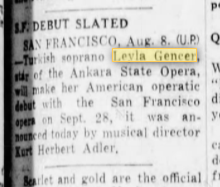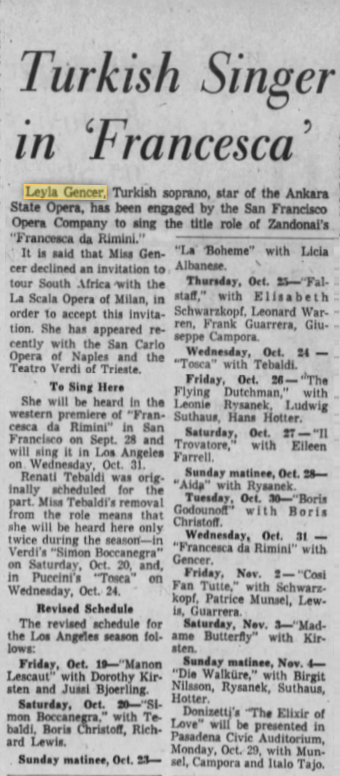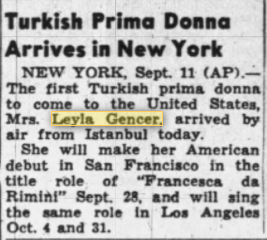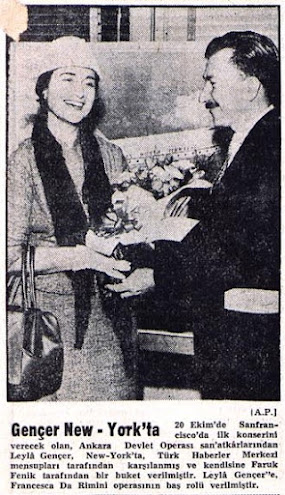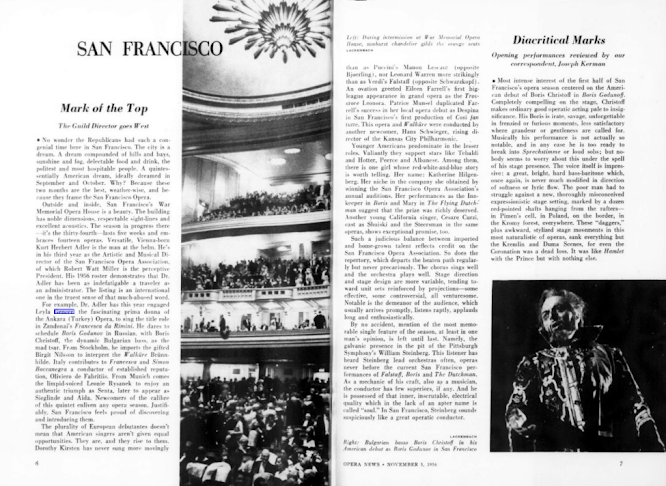FRANCESCA DA RIMINI
Photos © MOULIN STUDIOS, San Francisco
GENCER AT SAN FRANCISCO OPERA
FRANCESCA DA
RIMINI

 |
| With Oliviero de Fabritiis (Conductor) |
 |
| Robert Watt Miller (President of Opera Union), Kurt Herbert Adler (General Manager SF Opera) |
 |
| Carlo Maestrini (Stage Director), Mary Gray (Biancofore), Anselmo Colzani (Giovanni), Gianni Lazzari (Chorus Master), Oliviero de Fabritiis (Conductor), Kurt Herbert Adler (General Manager) |
 |
| Carlo Maestrini (Stage Director), Oliviero de Fabritiis (Conductor), Mary Gray (Biancofore) |

 |
| Robert Watt Miller (President of Opera Union), Kurt Herbert Adler (General Manager) |
 |
| Anselmo Colzani (Giovanni), Oliviero de Fabritiis (Conductor), Kurt Herbert Adler (General Manager) |
 |
| Ayşe Kayaalp, Cem İpekçi (Turkish exchange students in SF) |
 |
| Engin Cezzar, Fatma Cezzar (her friends) “Everyman, I will go with thee and be thy guide, in
thy most need to go by thy side”
To her friend Engin Cezzar Date: 31.12.1948 Signed by Leyla Gencer |
 |
| Hotel Mark Hopkins (Argonaut Room): Attilia Radice (Italian Primaballerina and Mr. De Fabritiis’ wife) |
 |
| Hotel Mark Hopkins (Argonaut Room): Sir Robert Haddew (British Counsul General), Mrs. Kurt Herbert Adler, Hans Hotter (Baritone) |
 |
| Fort Point “Golden Gate” (with Fatma Cezzar) |
 |
| Golden Gate Park Japanese Tea Garden (with Fatma Cezzar) |
 |
| Golden Gate Park Japanese Tea Garden |
 |
| Coin Tower “Golden Gate" (with Fatma Cezzar) |
 |
| Coin Tower “Golden Gate" (with Fatma Cezzar) |



“Turkish Diva was given a standing ovation at the Opera Gala”
San Francisco's Coup
The San Francisco Opera, second to Manhattan's Metropolitan in rank, is second to none in discovering and importing good foreign singers. *Last week it pulled a double coup, gave U.S. listeners their first chance to hear famed Bulgarian Basso Boris Christoff and beauteous Turkish Soprano Leyla Gencer. Gencer, loved at first sight, was the modest and moving star of Zandonai's rarely heard Francesca da Rimini; Christoff, playing his temperament to the hilt, was almost the ruination of Boris Godunov.
 |
Un journal du soir a publié des détails intéressants sur l’arrivée de la grande artiste de l’Opéra National d'Ankara Mme Leyla Gencer, qui a été engagée, pour six semaines, par l'Opéra de San Francisco. Elle chantera ensuite au Métropolitain Opera de New York, ce qui est un événement artistique considérable.
— Naturellement, c'est pour moi le plus grand bonheur de venir en Amérique. Et elle parla ensuite de ses débuts et succès sur les scènes d'Europe.
Les journalistes américains, souhaitent bon succès et déclarèrent que le public sera heureux d'entendre la soprano d'Ankara. ;
THE SAN FRANCISCO OPERA 1922 - 1978
About Leyla Gencer’s 1956 Company Debut
Pfaff: Another singer from the '56 season was Leyla Gencer. Am I saying her name, right?
Pfaff: What was his name?
Pfaff: What were her virtues as a singer?
 |
| Gencer with Kurt Herbert Adler, San Francisco Photo © BILL COGAN, San Francisco |
Atatürk Araştırma Merkezi Dergisi
Journal of Atatürk Research Center
ISSN 1011- 727X
Türk soprano Leyla Gencer’in San Francisco’da “Francesca Da Rimini” adındaki operanın başrolünde gösterdiği başarı ise Türkiye adına sanatsal bir başarı olarak basın ve yayın organlarında ses getirmişti. San Francisco’da yayınlanan “Call-Bulletin” dergisinin opera tenkitçisi Marie Hicks Davidson konuya ilişkin olarak Gencer hakkında: “Bayan Gencer, şahsen çok benzediği Elenora Duse kadar sanatkâr olduğunu ispat etmiştir. Sesi gayet zengindir. Pes ve tiz tonlarda aynı kolaylıkla söyleyebilmektedir. Bilhassa bir tiyatro olarak başarısı eşsizdir. Sahneyi bir kraliçe edasıyla dolduruyor. Leyla Gencer kendisini opera âleminin seçilmişleri olarak kabul edebilir (177)” şeklinde yorum yapmıştı. Gencer, İtalya’da ünlü Scala Operası’nda temsil edilen “Manon Lescaut Operası’nda 22 Ocak 1957 (178), “Traviata Operası’nda ise 11 Haziran 1957 tarihinde başrol oynamıştı (179)
“Leyla Gencer’in Başarısı”, TTOK Belleteni, S 189, Ekim 1957, s.6. (177)
“Leyla Gencer Scala Operası’nda”, TTOK Belleteni, S 178, Kasım 1956, s.5. (178)
“Leyla Gencer’in Yeni Bir Muvaffakiyeti”, TTOK Belleteni, S 185, Haziran 1957, s.20 (179)



























































